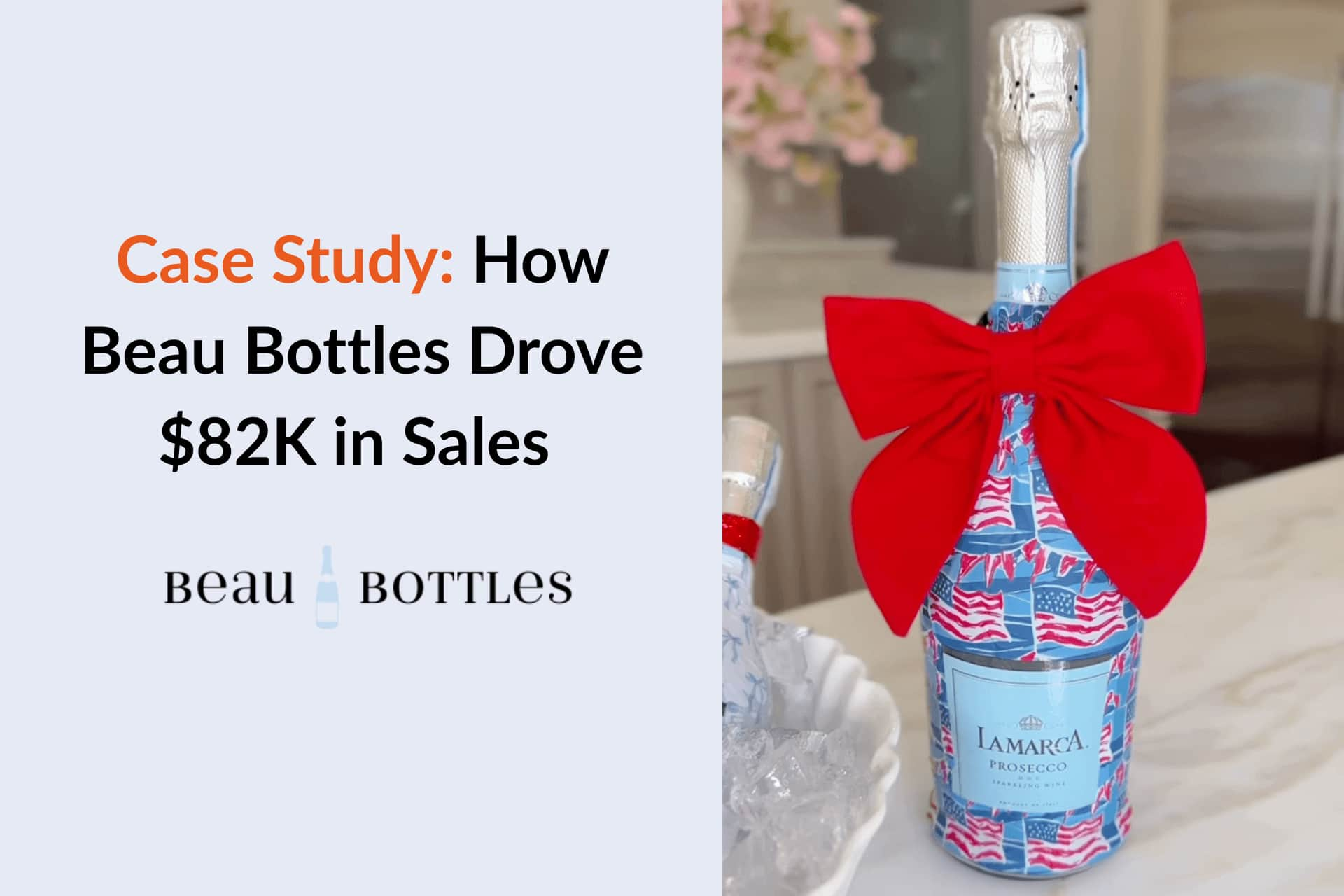





Many eCommerce brands rely on Loox to collect and showcase product reviews, but users often report pain points that push them to seek alternatives. The most common frustrations include limited customization for review widgets, high pricing as stores scale, and a lack of advanced integrations for influencer marketing and UGC campaigns.
Because reviews directly impact conversions and brand credibility, these shortcomings leave merchants looking for review and influencer tools that deliver more flexibility, better ROI, and stronger cross-channel performance.
According to the latest G2 2025 eCommerce Software Trends Report, brands that integrate reviews with influencer marketing campaigns see 34% higher conversion rates than those relying on reviews alone.
This makes evaluating Loox alternatives more important than ever for Shopify and WooCommerce stores aiming to grow. In this article, we’ll break down the top 10 alternatives to Loox, comparing features, pricing, and reviews so you can make an informed choice.
Here’s a detailed section with four specific reasons why users look for Loox alternatives, rounded in the feedback from Shopify App reviews, G2, and other sources:
Several users warn that using Loox can make a store look “suspicious,” with some raising concerns about the platform enabling fake-looking reviews. This damages credibility and can lead to frustrated customers.
Shopify users repeatedly mention that Loox provides little to no support when issues arise. Merchants report long response times or no replies at all, leaving urgent problems unresolved and creating friction for brands that rely on responsive customer service.
Many reviewers highlight that Loox restricts design flexibility. For example, the review widget forces merchants to use Google Fonts instead of their own brand fonts, offers minimal color customization, and lacks multilingual support beyond a fixed set of languages.
Several merchants describe the app as either overly complex or too simplistic, providing little real value for the effort required. Others share that canceling the subscription is “near impossible,” which adds unnecessary stress when trying to switch to a better alternative.
Our comparison focuses on several key aspects:

Platform Coverage: Designed primarily for Shopify stores, with integrations for Google Shopping, Meta Shops, Klaviyo, Omnisend, and Shopify Plus.
Best For: Loox is best for Shopify merchants of all sizes looking to showcase photo and video product reviews, build trust with UGC, and drive growth through referrals and upsells.
Pricing: Loox is billed as part of Shopify’s 30-day subscription billing period. There’s no annual commitment and you can cancel your subscription at any time. Free trials available for all plans.
Reviews: 4.9 / 5.0 (G2)
Ease of Use (UX/UI): Most users describe Loox as easy to set up with no coding required, and widgets integrate seamlessly across product pages. However, some report lagging performance on mobile and limited design flexibility (restricted fonts and colors).
Customer Support: Loox claims 24/7 email support, but reviews are mixed. Some users praise fast responses, while others mention delays and lack of helpful resolutions, especially when trying to cancel or migrate away from the app.
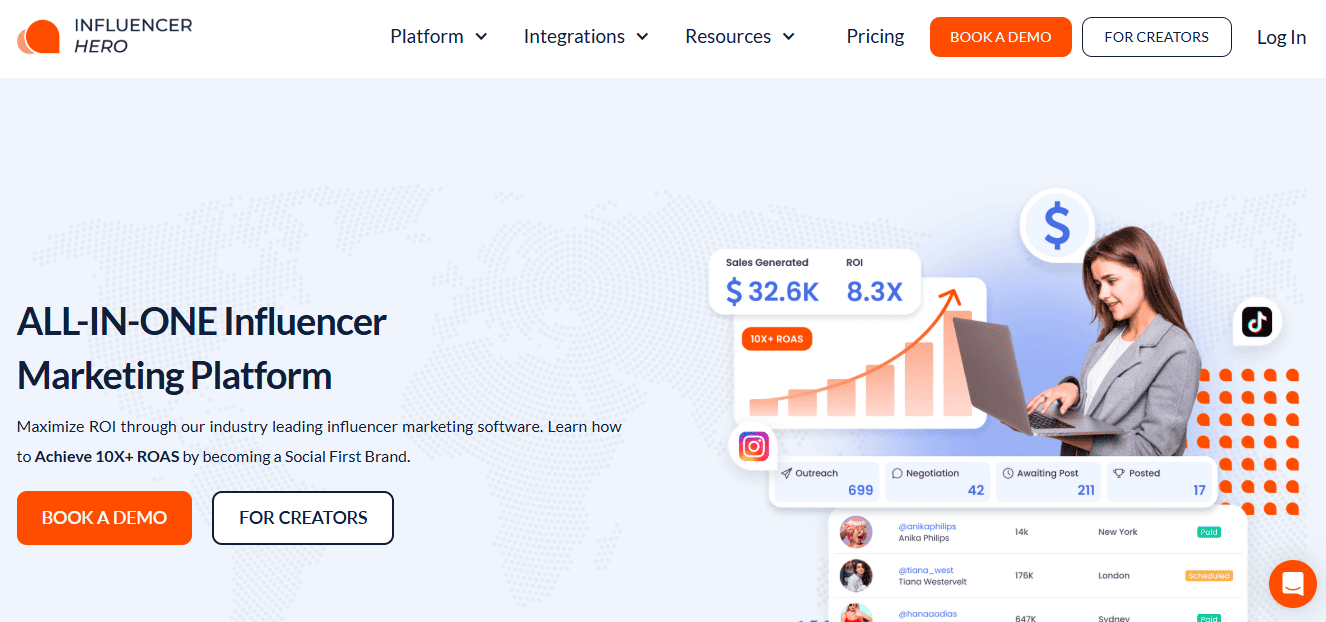
Platform Coverage: Instagram, TikTok, YouTube, Facebook, Pinterest, Snapchat, X, Twitch
Best For: Influencer Hero is best for D2C and eCommerce brands that want an all-in-one solution to manage influencer discovery, outreach, CRM, UGC, affiliate campaigns, and reporting at scale.
Pricing: (Plans are monthly and scalable.)
Reviews: 5.0 / 5.0 (Capterra)
Ease of Use (UX/UI): Influencer Hero is known for its intuitive dashboard and clean design that makes navigation simple even for new teams. Drag-and-drop workflows, customizable email templates, and automated campaign stages save brands hours of manual work.
Customer Support: Customer support is a key differentiator. Every plan includes a dedicated account manager from day one, plus 24/7 real-human live chat, responsive email support, and an extensive Help Center with guides and video tutorials. Pro users also get access to a private Slack channel for faster communication and continuous strategy guidance.
While Loox focuses mainly on product reviews and referrals for Shopify stores, Influencer Hero provides a full influencer marketing ecosystem across Instagram, TikTok, YouTube, and more, with CRM, outreach, analytics, and UGC collection. Loox is a strong choice for basic review widgets, but its scope is narrow compared to Influencer Hero’s multi-platform campaign management.
Pricing is also a key difference. Loox starts low ($12.99/month) but jumps to $299.99/month with limited capabilities, while Influencer Hero starts at $649/month but includes all-in-one features like advanced discovery, gifting, storefronts, and affiliate tracking.
For brands that want to scale influencer and affiliate campaigns beyond reviews, Influencer Hero offers a far more powerful and ROI-driven solution
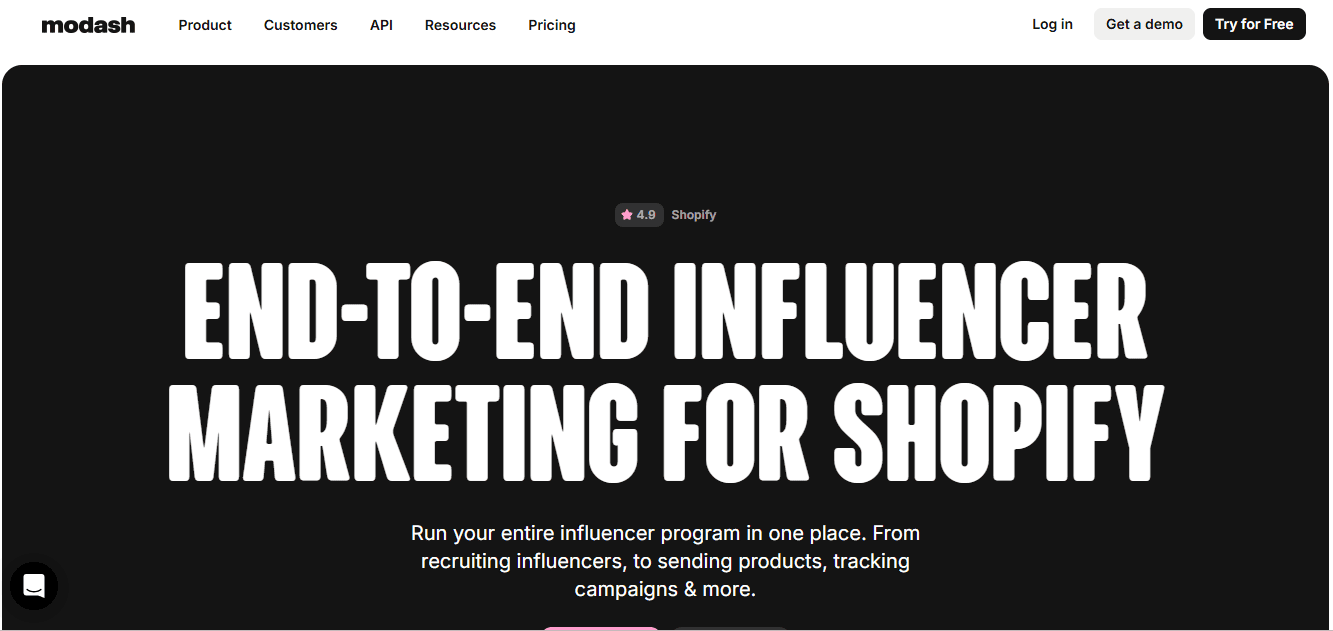
Platform Coverage: Instagram, TikTok, YouTube, and offers profile recognition for platforms like X, Snapchat, and others.
Best For: Modash is best for eCommerce brands looking to scale influencer marketing and affiliate programs, especially those using Shopify. It supports businesses aiming to streamline their influencer outreach, campaign tracking, and payment processes.
Pricing: Modash offers free trials to both their Essentials and Performance plan.
Reviews: 4.9 / 5.0(Capterra.com)
Ease of Use (UX/UI): Users find Modash intuitive and easy to navigate, especially for managing campaigns and influencer outreach. Its streamlined interface is praised for reducing complexity in influencer marketing.
Customer Support: Modash is noted for excellent customer support, with users highlighting responsive and helpful onboarding. The platform’s team is accessible and provides robust assistance through various channels.
Modash differentiates itself from Loox by offering a more comprehensive influencer marketing suite with a focus on discovery, outreach, and tracking, particularly for Shopify-based businesses.
It stands out with its AI-powered influencer search, massive creator pool, and automated affiliate payment features. On the other hand, Loox is highly visual, focusing primarily on user-generated content for reviews and testimonials, whereas Modash provides more tools for end-to-end campaign management.
In terms of pricing, Modash’s Essentials plan starts at $199/month, and the Performance plan costs $499/month, offering greater access to features like email outreach and campaign tracking. While Loox is more affordable for brands looking for review-based solutions, Modash is better suited for businesses looking for a full-fledged influencer marketing platform with affiliate capabilities.
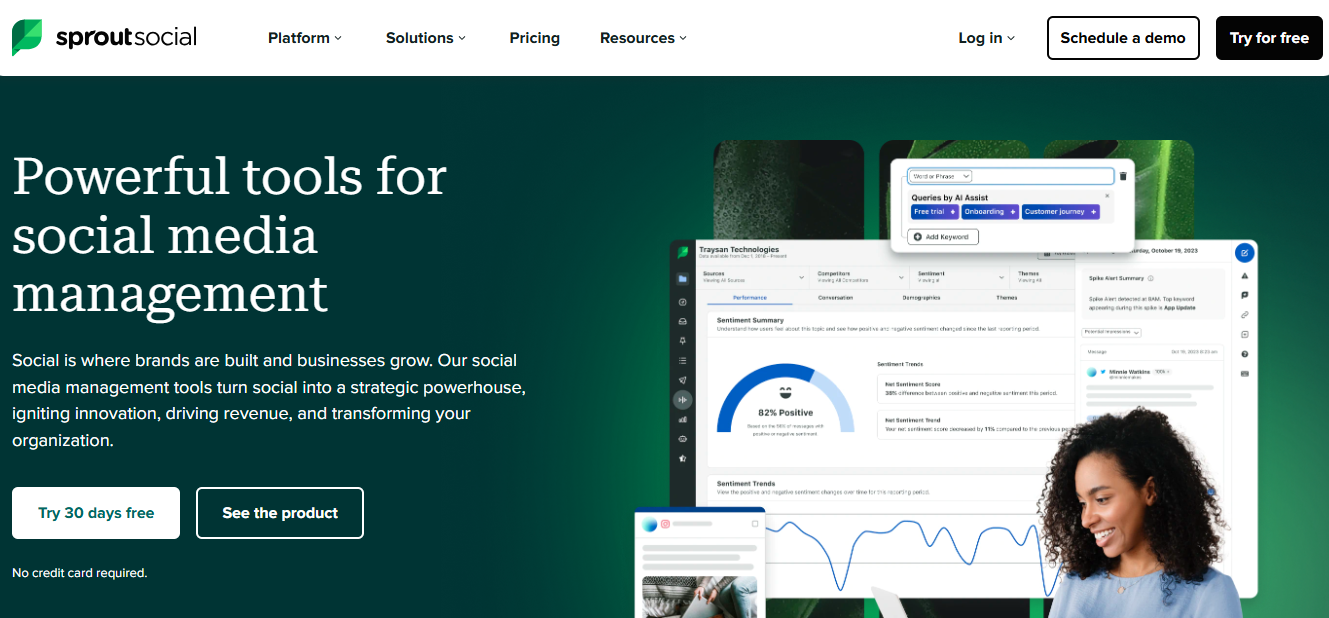
Platform Coverage: SproutSocial supports Instagram, TikTok, and YouTube, focusing on core social channels for content publishing, analytics, and influencer collaboration.
Best For: SproutSocial is best for enterprise-level brands and teams managing large-scale influencer marketing campaigns, especially those seeking advanced analytics, content approval workflows, and robust reporting tools.
Pricing: Starts at $1,599/month per user. Each extra seat is $600/month, billed annually.
Reviews: 4.5 / 5.0 (Capterra.com)
User Experience (UX/UI): Users find SproutSocial intuitive for managing influencer campaigns, with customizable dashboards and workflows that streamline communication and campaign tracking. Some users have noted that the platform can feel complex at first.
Customer Support: SproutSocial is praised for its responsive customer support, with users highlighting the helpfulness and professionalism of the support team. Onboarding and training resources are comprehensive, ensuring users can quickly get up to speed.
Check out our in-depth review of the top 10 Sprout Social alternatives, complete with pricing comparisons, feature breakdowns, pros, cons, and more.
Loox is designed to help brands leverage user-generated content (UGC) through product reviews and testimonials, making it ideal for businesses that want to showcase customer feedback to boost conversions.
SproutSocial, by comparison, delivers a full-featured influencer marketing platform geared toward large-scale campaigns. It offers analytics, brand safety tools, and content approval workflows, providing enterprise teams with advanced reporting and influencer management capabilities.
While Loox is more affordable and well-suited for brands focused on reviews and photo sharing, SproutSocial’s pricing, starting at $1,599 per user/month, reflects its extensive functionality for complex, high-volume campaigns.
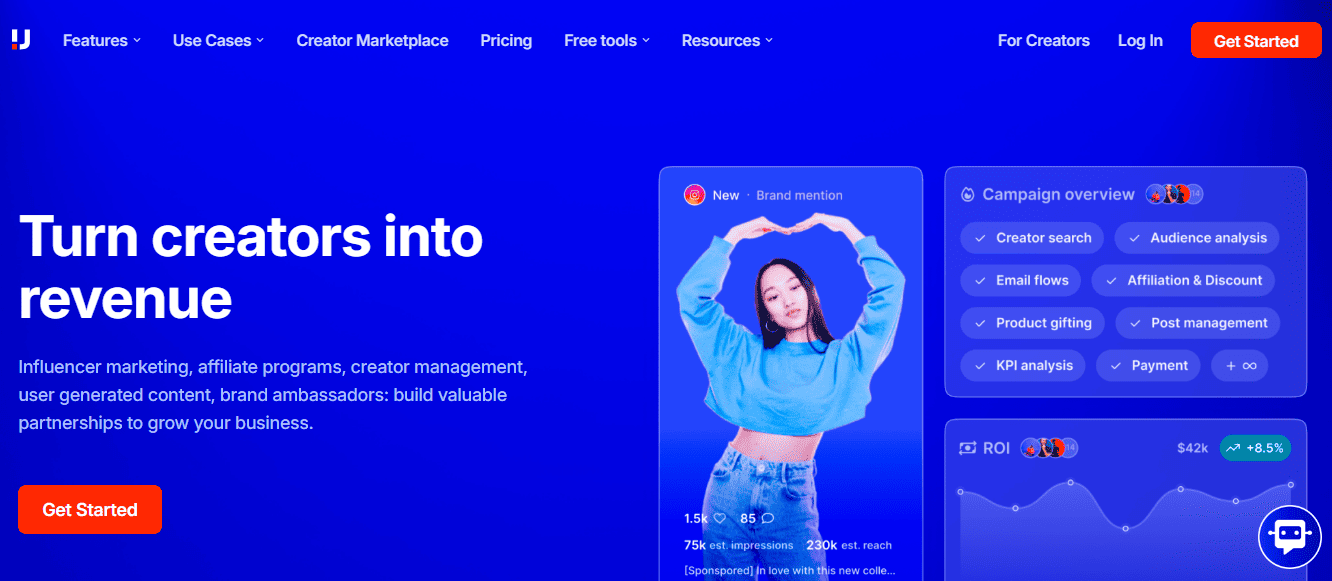
Platform Coverage: Instagram, TikTok, YouTube, X , Twitch, Pinterest, WordPress blogs.
Best For: eCommerce brands, particularly those on Shopify or Amazon, who want to scale their influencer and affiliate marketing campaigns.
Pricing: Upfluence offers annual contracts with the following pricing.
Reviews: 4.6 / 5.0 (G2)
Ease of Use (UX/UI): Users generally report that Upfluence’s platform offers an intuitive design with a powerful search engine and CRM system. However, some users note a slight learning curve, especially for beginners, due to the extensive functionality and various features available.
Customer Support: Upfluence offers solid customer support with a responsive team ready to assist with queries. Users highlight the quick response times and helpfulness of the support staff. However, some users feel that the support could be more proactive in offering tutorials or guides to help new users get up to speed faster.
Both Loox and Upfluence offer influencer marketing solutions, but they cater to slightly different needs. Loox focuses more on visual reviews and user-generated content (UGC) for eCommerce stores, allowing brands to gather and display customer reviews and images effectively. In contrast, Upfluence is a comprehensive influencer management platform that handles everything from influencer discovery to campaign management and payment tracking, making it ideal for larger campaigns with multiple influencers and higher budgets.
When comparing pricing, Upfluence is significantly more expensive, with costs starting at $1,276 per month and requiring annual commitments. This higher price tag is justified by the extensive suite of tools and integrations, particularly with Shopify and Amazon. Loox, however, has a more affordable pricing structure tailored to smaller businesses focusing on review-driven UGC.
In summary, Upfluence is best for businesses looking for a robust, all-in-one influencer marketing solution with deep eCommerce integrations, while Loox might be more appropriate for businesses focused on leveraging customer reviews for social proof with a lower budget.
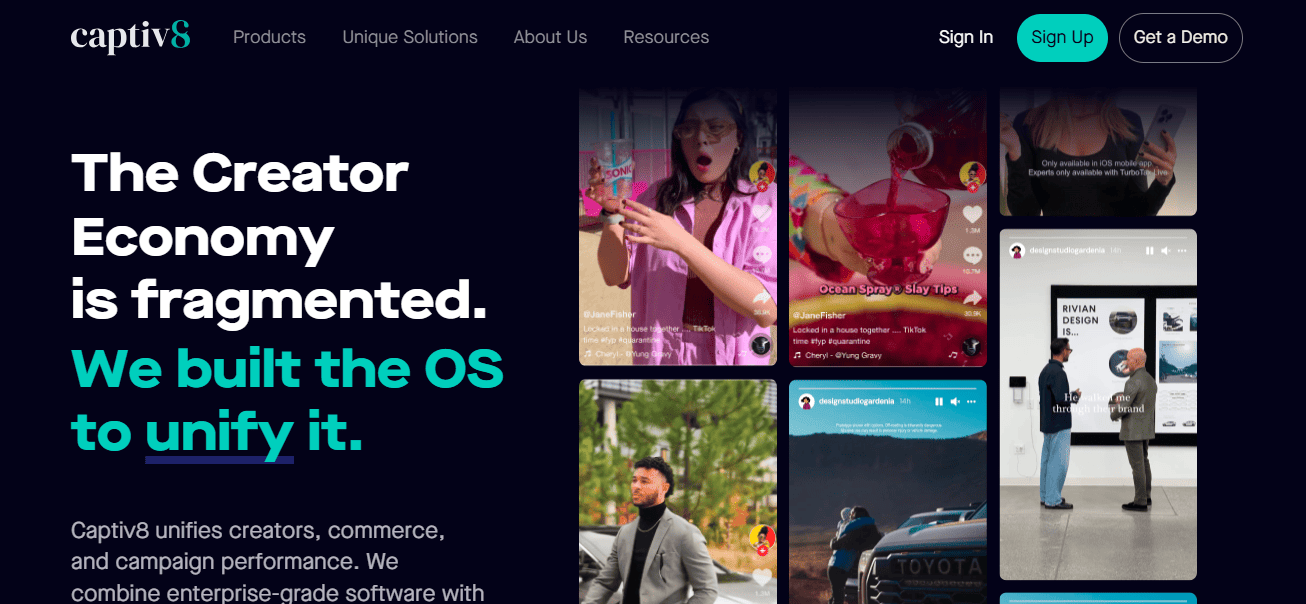
Platform Coverage: Captiv8 supports influencer campaigns across Instagram, YouTube, TikTok, Facebook, Twitter, and Pinterest.
Best For: Captiv8 is ideal for large enterprises or brands that need a robust and scalable influencer marketing platform. It’s best for brands looking to track influencer campaigns, collaborate within teams, and leverage advanced performance metrics to optimize their marketing strategies, especially in competitive environments.
Pricing:
No monthly or customizable plans are available; pricing is rigid and enterprise-focused
Reviews: 4.6 / 5.0 (G2)
Ease of Use (UX/UI): Captiv8 offers a comprehensive platform with a wide range of features, but users often note that it can be overwhelming for beginners due to the complexity and high volume of options. Once familiar with the platform, it becomes easier to navigate, especially with features like drag-and-drop metrics and saved filters.
Customer Support: Customer support has received mixed reviews, with some users reporting unresponsiveness and slow resolution of issues, particularly regarding account management and payment processes. Despite these complaints, others have highlighted the helpfulness of support staff when issues are addressed.
Loox and Captiv8 serve different purposes within influencer marketing. Loox focuses on customer reviews and UGC for eCommerce brands, helping businesses build social proof and attract customers with authentic visual content. It’s particularly effective for brands that want to display product feedback directly on their websites or social media.
Captiv8, in contrast, is an enterprise-grade platform designed for larger brands needing a comprehensive, all-in-one influencer marketing solution. It excels in creator discovery, advanced tracking, and team collaboration, making it ideal for companies managing large-scale campaigns across multiple platforms. Pricing starts at $25,000 per year, with extra costs for premium features like affiliate programs and storefronts, whereas Loox offers a more accessible pricing structure for small to mid-sized brands.
In short, Loox is best for small to mid-sized businesses prioritizing UGC and simplicity, while Captiv8 is suited for brands seeking advanced tracking, collaboration, and enterprise-level capabilities, despite its higher cost.
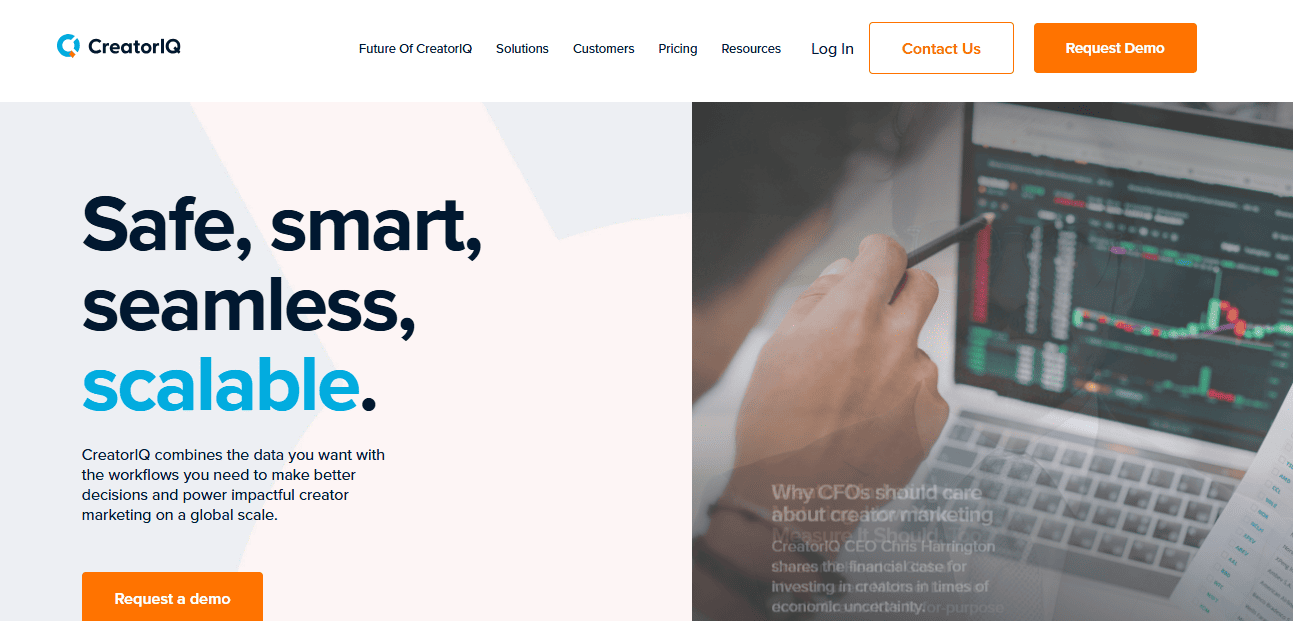
Platform Coverage: Instagram, TikTok, YouTube, Facebook, Pinterest, Twitch, X.
Best For: eCommerce brands, global enterprises, and agencies that need to scale influencer and creator marketing programs through advanced discovery, CRM, campaign management, and robust analytics capabilities.
Pricing: All plans are billed annually.
Reviews: 4.6 / 5.0 (G2)
Ease of Use (UX/UI): Users consistently describe CreatorIQ’s interface as intuitive and visually modern, noting its dashboard is easy to navigate and organizes complex workflows in one place.
Customer Support: CreatorIQ receives strong praise for its exceptional and responsive customer support. Users highlight how quickly issues, especially payment-related ones, are addressed and how knowledgeable and helpful the support team is.
Discover our curated list of the top 10 CreatorIQ alternatives to elevate your influencer marketing strategy and drive better campaign results.
Loox, being a product review and photo-centric solution, is designed for eCommerce stores focused on gathering UGC like reviews and photos, ideal for building social proof and visual testimonials. In contrast, CreatorIQ is built for comprehensive influencer and creator program management at scale. It supports influencer discovery, CRM, campaign execution, performance analytics, and industry benchmarking, making it suitable for brands or agencies with broader creator strategy needs.
In terms of pricing, CreatorIQ typically starts in the ballpark of $2,000 - $3,000 per month (around $24K–$36K per year) and often involves annual enterprise-level agreements, while Loox usually offers more budget-friendly, subscription-based pricing aligned with Shopify or small-to-medium business tiers.
Choose Loox if your main goal is leveraging customer-generated visual reviews to boost eCommerce trust and conversions, especially for smaller to mid-size brands. Choose CreatorIQ if you need an enterprise-capable platform that scales influencer discovery, collaboration, analytics, and ROI tracking across campaigns.
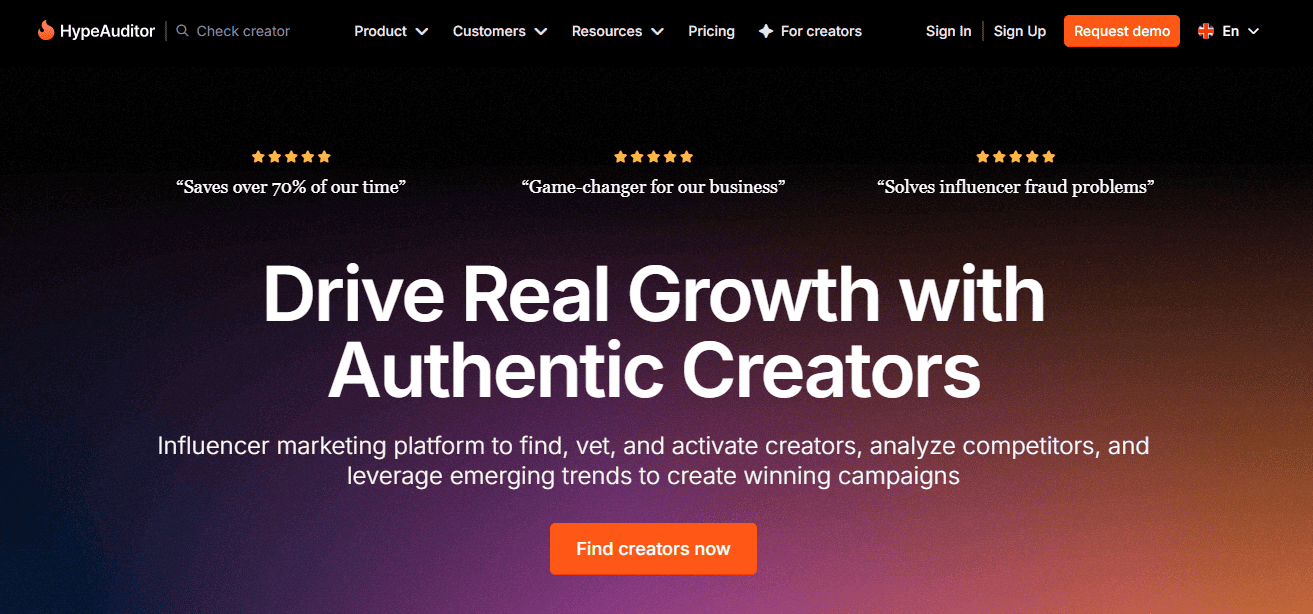
Platform Coverage: Instagram, TikTok, YouTube, Twitch, X (Twitter), Snapchat
Best For: Brands, agencies, and e-commerce businesses seeking a data-driven, all-in-one influencer marketing platform to discover authentic creators, manage campaigns across Instagram, TikTok, YouTube, Twitter, and Twitch, and ensure audience quality.
Pricing: Custom plans based on usage. Flexible contract terms depending on platform access, campaign volume, and number of reports.
Reviews: 4.5 / 5.0 (G2)
Ease of Use (UX/UI): Users frequently describe HypeAuditor as intuitive and user-friendly, with a clean, approachable design that simplifies finding and analyzing influencers.
Customer Support: Customer support receives consistently high praise for its responsiveness and helpfulness, especially when assisting with influencer discovery tasks on platforms like Instagram and TikTok.
Loox is tailored for e-commerce brands that want to harness customer-generated visuals, reviews, and social proof to boost conversions, especially effective for Shopify stores and SMBs. Choose Loox for visual review and social proof solutions, especially if your goal is to showcase customer-driven content in your store.
In contrast, HypeAuditor delivers a full-cycle influencer marketing platform, ideal for brands aiming to uncover and analyze authentic creators at scale, manage campaigns end-to-end, and measure ROI through deep analytics. Choose HypeAuditor if you need robust influencer discovery, audience authenticity, automated campaign workflows, and data-rich analytics to power influencer marketing at scale.
In terms of pricing, HypeAuditor starts around $399 per month, offering scalable plans with add-on features like campaign management and advanced reports. Loox typically operates on more affordable, tiered subscriptions aligned with smaller businesses.
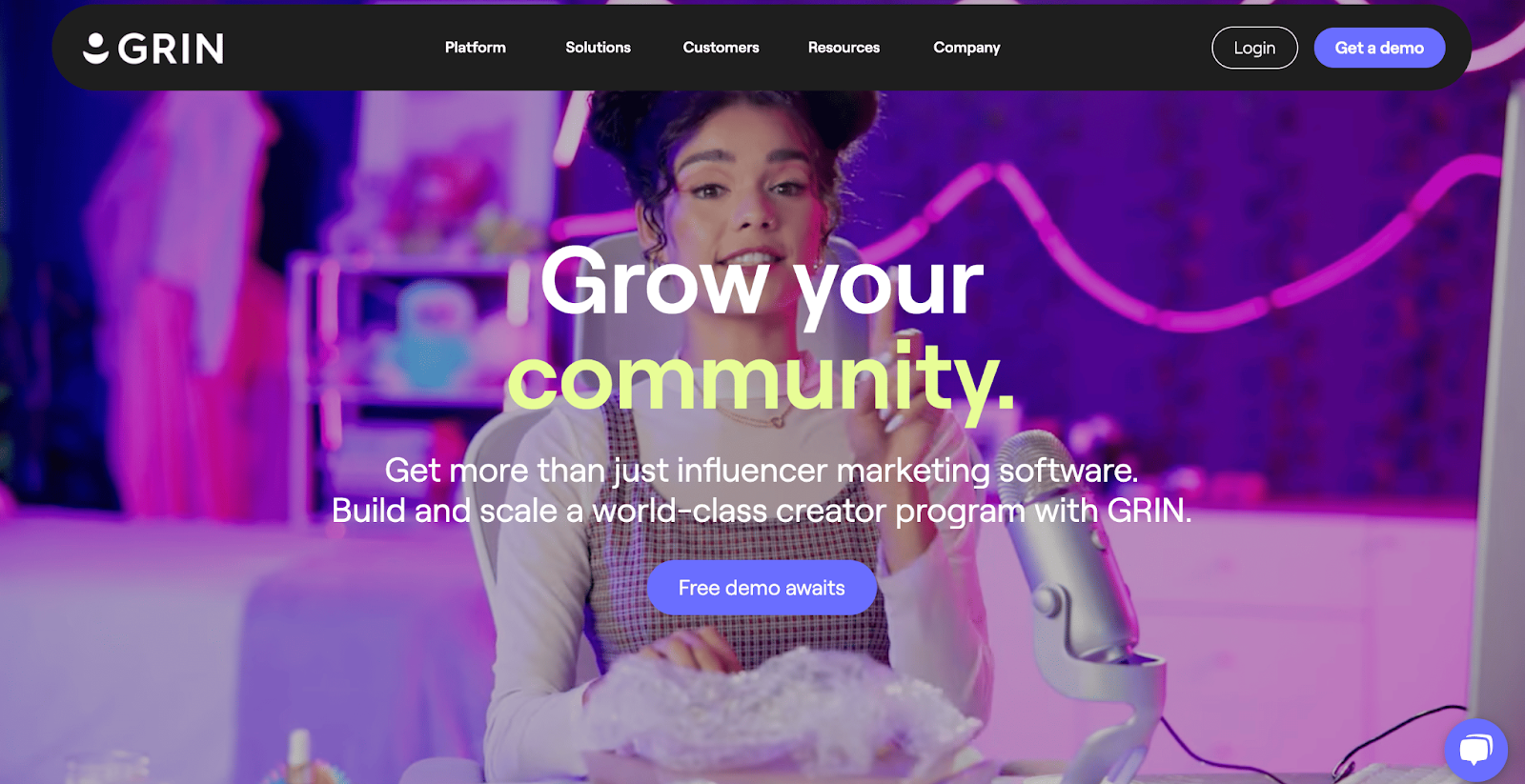
Platform Coverage: Instagram, TikTok, YouTube, X, Twitch, Snapchat
Best For: DTC and e-commerce brands aiming to scale influencer and creator programs with streamlined campaign execution, from discovery and outreach to content collection, payments, and performance tracking.
Pricing: Plans start at $25,000 per year, with monthly payments available and a required 12-month commitment; typical monthly costs range from $2,500 to over $10,000 depending on usage, though pricing transparency may vary based on selected features.
Reviews: 4.5 / 5.0 (G2)
Ease of Use (UX/UI): Most users find GRIN intuitive and straightforward; setting up campaigns, or generating trackable links and influencer payments, is generally seamless. It’s praised for its UI clarity and ease in working with micro-influencers. Some complexity arises when managing diverse influencer terms or navigating deeper workflows.
Customer Support: GRIN’s support team is described as knowledgeable, responsive, and very helpful, especially for onboarding assistance and troubleshooting logistics. There are occasional mentions of frustrations around billing practices and contract rigidity..
Loox focuses on customer-generated visual content and reviews, making it ideal for eCommerce stores looking to increase conversions through social proof. It is particularly useful for Shopify merchants aiming to leverage UGC to build trust and drive sales.
GRIN, by contrast, is a comprehensive influencer marketing platform designed for end-to-end campaign management. It handles creator discovery, outreach, content tracking, affiliate management, and analytics, all in one place. GRIN is best for brands that need a full-scale influencer marketing engine with workflow automation, relationship CRM, affiliate tracking, and real-time performance insights for strategic growth.
In terms of pricing, GRIN typically starts around $999 to $2,500 per month depending on features and scale, usually with annual contracts. Loox offers more accessible, tiered monthly plans, making it a better fit for smaller businesses seeking an affordable, flexible solution.
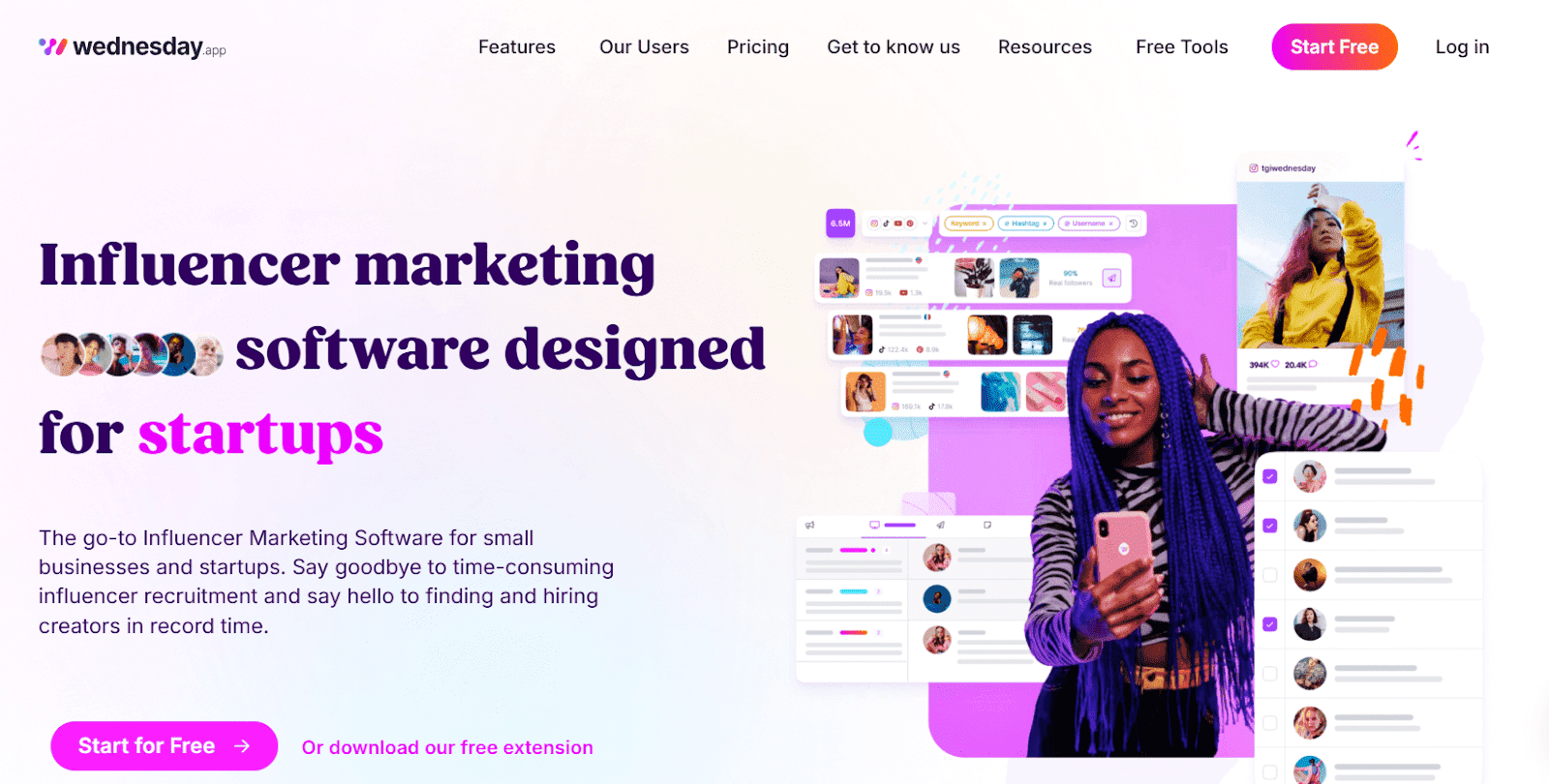
Platform Coverage: Instagram, TikTok, YouTube, Twitter (X), Twitch, Pinterest, WordPress
Best For: Startups, small businesses, and solopreneurs seeking an affordable, no-frills platform to streamline influencer discovery, CRM, and campaign management without the need for enterprise-scale tools.
Pricing:
Reviews: 5.0 / 5.0 (Product Hunt)
Ease of Use (UX/UI): Users consistently highlight WednesdayApp’s smooth onboarding and intuitive interface. Many describe it as “super affordable with tons of search options,” which makes finding creators accessible and fast. A few note that while it can feel slightly challenging to navigate at first, built-in tutorials help ease the learning curve.
Customer Support: Feedback on customer support is sparse, but the platform’s free-trial model and in-app guidance suggest it's positioned to be self-service friendly. Users appreciate that they can begin testing the tool without commitment or lengthy setups.
Check out our list of the top 10 Wednesday.App alternatives to enhance your influencer marketing strategy with better scalability, pricing, and features.
Loox specializes in collecting and showcasing customer-generated visual reviews and photos, making it ideal for e-commerce brands (particularly Shopify stores) looking to build social proof and conversion through authentic customer content.
On the other hand, WednesdayApp focuses on influencer discovery and lightweight campaign management, offering an affordable entry point for startups and small businesses that want to manage influencer outreach, content, and relationships without heavy investment.
In terms of pricing, WednesdayApp starts at $79/month with a generous free tier, making it accessible and scalable for growing teams. Loox tends to offer tiered e-commerce plans with visual highlights and customer reviews that may be more cost-effective for brands needing UGC-based conversion, but doesn’t address influencer workflows.
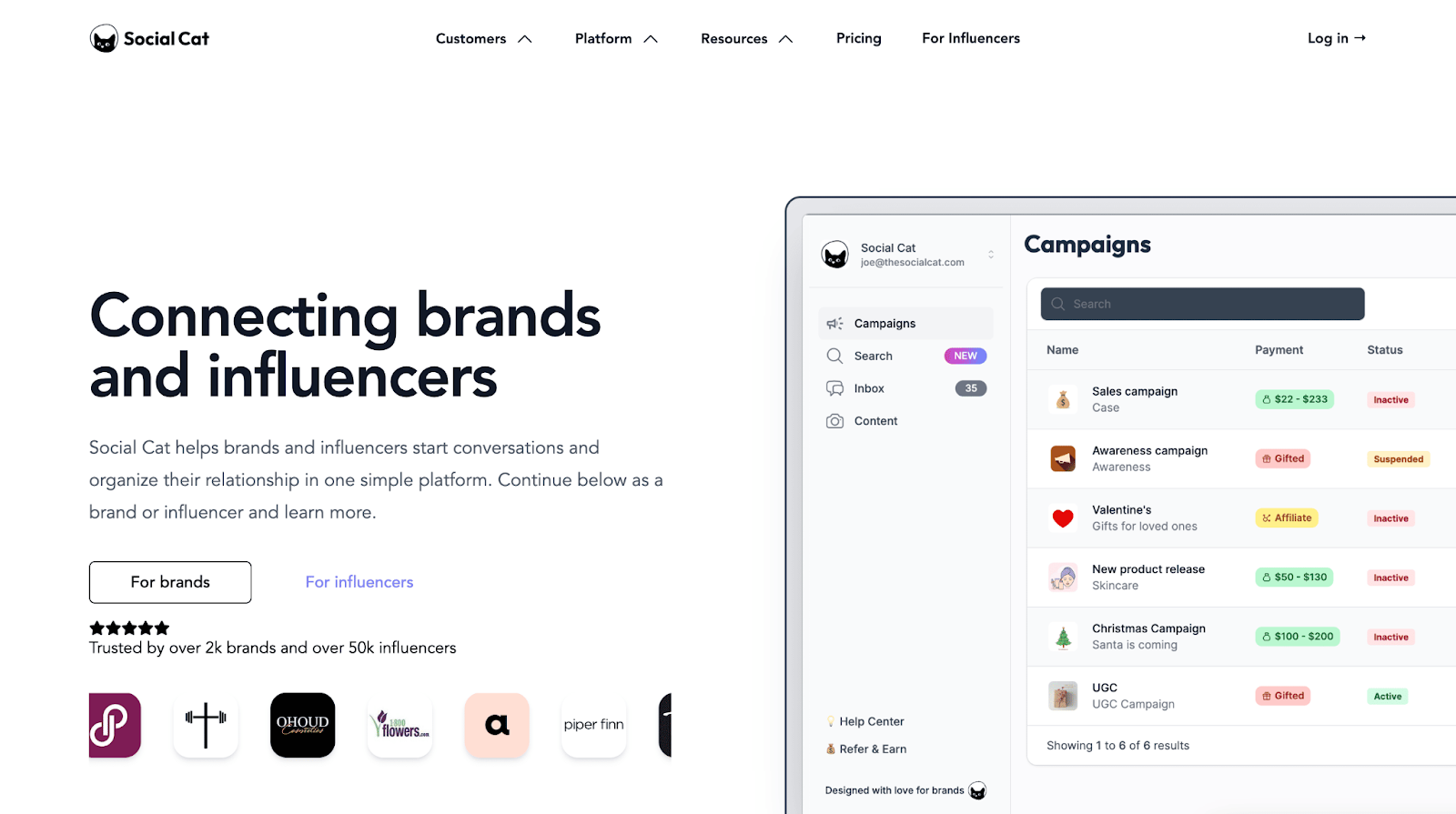
Platform Coverage: Instagram and TikTok.
Best For: Small to mid-sized eCommerce brands and agencies looking to collaborate with micro-influencers for gifted, paid, or affiliate campaigns, with a strong focus on affordable, user-friendly UGC and influencer marketing.
Pricing:
Reviews: 4.3/5.0 (Trustpilot)
Ease of Use (UX/UI): Users report that Social Cat offers a simple, intuitive onboarding process, where brands define their goals, fill in profile details, and easily connect through a “Tinder-like” matching experience.
Customer Support: The platform is praised for its transparent, cancel-anytime pricing, with no long-term contracts and visible access to plan upgrades or support. Small brands appreciate the affordability and guidance, including expert sessions in some plans.
Loox specializes in customer-generated visual reviews that help build trust and boost conversions, particularly for Shopify merchants. Its focus is on UGC from buyers rather than influencer-led campaigns. Pick Loox if your goal is to collect and showcase customer review photos to enhance product pages and social proof.
SocialCat, on the other hand, is centered on micro-influencer collaborations, providing tools for discovery, messaging, contracts, UGC collection, and campaign management. It’s designed for small brands seeking flexible influencer marketing without a large upfront cost. Pick SocialCat if you want to run influencer campaigns, generate licensed UGC from creators, and manage direct collaboration workflows with micro-influencers.
In terms of pricing, SocialCat starts at $99/month (Essentials plan) with clear tiers and a trial. Loox offers tiered plans focused on eCommerce UGC and social proof, making it competitive for Shopify stores, but it does not support influencer campaign management.
While Loox is popular for its visual UGC features, recurring concerns such as limited customization, poor customer support, and expensive scaling make it less appealing for growing businesses. The alternatives outlined provide stronger flexibility, better integrations, and a broader scope of tools, ranging from micro-influencer collaboration to full-service influencer marketing platforms, allowing brands to choose the option that best aligns with their goals and budget.
Among these, Influencer Hero stands out as one of the best alternatives, especially for D2C brands aiming to integrate product reviews, influencer marketing, UGC collection, and affiliate campaigns into one platform. Unlike single-purpose review apps, it delivers a full-stack ecosystem designed for scalable growth, making it a strong choice for businesses ready to move past the limitations of Loox.
Ultimately, selecting the right alternative depends on whether a brand prioritizes affordability, advanced influencer tools, or enterprise-level features, but the options highlighted here ensure that every eCommerce business can find a solution that better supports long-term success.

Loox is popular for reviews, but users report issues with limited customization, high costs at scale, and weak support. Many brands switch to tools like Influencer Hero that also offer influencer marketing and UGC features.
Influencer Hero is one of the best alternatives because it combines reviews with influencer discovery, outreach, CRM, UGC, and affiliate tracking, going far beyond Loox’s core review features.
SocialCat (from $99/month) and Wednesday.App (with a free plan) are budget-friendly options that help small brands run influencer and UGC campaigns at low cost.
Platforms like Influencer Hero and CreatorIQ serve large enterprises with advanced analytics and influencer tools. Influencer Hero also works well for scaling brands needing enterprise-level functionality.
If you only need reviews, choose affordable apps like Judge.me. For all-in-one influencer and UGC campaigns, go with Influencer Hero. For enterprise needs, consider platforms like CreatorIQ or Sprout Social.



Schedule a Demo with one of our media experts below.